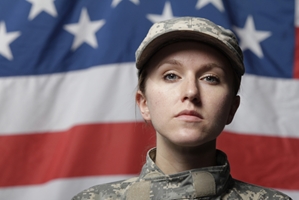The Armed Forces has changed a lot in the last several years, and that includes recent strides for women in the service. Earlier this year, the military announced it would allow female soldiers to serve in combat roles – something which was previously prohibited – and one group of women at Fort Bragg is taking things to a whole new level, as The 18th Fires Brigade is preparing to welcome the first female enlisted soldiers in an artillery unit, the Fayetteville Observer reports.
Nearly a year in the making
Former-Secretary of Defense Leon Panetta announced the shift in policy allowing women to serve on the front line earlier this year, but the wheels were set in motion at Fort Bragg well before then. In fact, last summer officials there launched a pilot program to see whether women were capable of joining artillery units previously open only to male troops. Being a member of these units is both physically and mentally demanding. Along with having to be able to lift 100-pound rounds, soldiers also have to be familiar with everything from physics to metrology. For Lt. Shannon Syphus, the opportunity is one she relishes.
"I didn't know prior that it wasn't open," Syphus told the newspaper. "But I just fell in love. I can get on the radio and call for fire and something explodes. I love the technical aspects — the math and the precision. You can't find that with any other job in the Army."
Continuous change
As the brigade prepares to welcome its newest members, the rest of the Armed Forces is undergoing similar changes. For instance, earlier in March, Tech. Sgt. Leslie Cumming, the only female military training instructor in the Air National Guard, broke new ground when she was named Air University Noncommissioned Officer of the Year, according to the official website of the Air Force.
Cumming's accomplishment, along with the contributions of Syphus and others, did not come as much of a surprise to many analysts. Experts point to the fact that many women, who make up about 15 percent of the Armed Forces, were already serving in the front lines because of the unpredictable nature of war, according to the Los Angeles Times.

